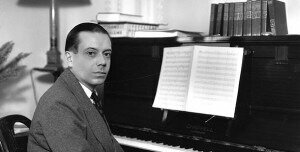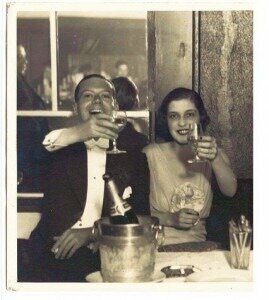
Cole Porter was born June 9, 1891, at Peru, Indiana, the son of
pharmacist Samuel Fenwick Porter and Kate Cole. Cole was raised on a
750-acre fruit ranch. Kate Cole married Samuel Porter in 1884 and had
two children, Louis and Rachel, who both died in infancy. Porter's
grandfather, J.G. Cole, was a multi-millionaire who made his fortune in
the coal and western timber business. His mother introduced him to the
violin and the piano. Cole started riding horses at age six and began to
studying piano at eight at Indiana's Marion Conservatory. By age ten,
he had begun to compose songs, and his first song was entitled "Song of
the Birds".
He attended Worcester Academy in Worcester,
Massachusetts, in 1905, an elite private school from which he graduated
in 1909 as class valedictorian. That summer he toured Europe as a
graduation present from his grandfather. That fall, he entered Yale
University and lived in a single room at Garland's Lodging House at 242
York Street in New Haven, CT, and became a member of the Freshman Glee
Club. In 1910, he published his first song, "Bridget McGuire". While at
Yale, he wrote football fight songs including the "Yale Bulldog Song"
and "Bingo Eli Yale," which was introduced at a Yale dining hall dinner
concert. Classmates include poet Archibald Macleish, Bill Crocker of San Francisco banking family and actor Monty Woolley. Dean Acheson,
later to be U.S. Secretary of State, lived in the same dorm with Porter
and was a good friend of Porter. In his senior year he was president of
the University Glee club and a football cheerleader.
Porter
graduated from Yale in 1913 with a BA degree. He attended Harvard Law
school from 1913 to 1914 and the Harvard School of Music from 1915 to
1916. In 1917 he went to France and distributed foodstuffs to
war-ravaged villages. In April 1918 he joined the 32nd Field Artillery
Regiment and worked with the Bureau of the Military Attache of the US.
During this time he met the woman who would become his wife, Linda Lee
Thomas, a wealthy Kentucky divorcée, at a breakfast reception at the
Ritz Hotel in Paris. He did not, as is often rumored, join the French
Foreign Legion at this time, nor receive a commission in the French army
and see combat as an officer.
In 1919 he rented an apartment in
Paris, enrolled in a school specializing in music composition and
studied with Vincent D'indy. On December 18, 1919, married Linda Lee
Thomas, honeymooning in the south of France. This was a "professional"
marriage, as Cole was, in fact, gay. Linda had been previously married
to a newspaper publisher and was described as a beautiful woman who was
one of the most celebrated hostesses in Europe. The Porters made their
home on the Rue Monsieur in Paris, where their parties were renowned as
long and brilliant. They hired the Monte Carlo Ballet for one of their
affairs; once, on a whim, they transported all of their guests to the
French Riviera.
In 1923 they moved to Venice, Italy, where they lived in the Rezzonico Palace, the former home of poets Elizabeth Barrett Browning and Robert Browning.
They built an extravagant floating night club that would accommodate up
to 100 guests. They conducted elaborate games including treasure hunts
through the canals and arranged spectacular balls.
Porter's first play on Broadway featured a former ballet dancer, actor Clifton Webb. He collaborated with E. Ray Goetz, the brother-in-law of Irving Berlin, on several Broadway plays, as Goetz was an established producer and lyricist.
His ballad "Love For Sale" was introduced on December 8, 1930, in a revue that starred Jimmy Durante and was introduced by Kathryn Crawford. Walter Winchell,
the newspaper columnist and radio personality, promoted the song, which
was later banned by many radio stations because of its content. In
1934, his hit "Anything Goes" appeared on Broadway. During the show's
hectic rehearsal Porter once asked the stage doorman what he thought the
show should be called. The doorman responded that nothing seemed to go
right, with so many things being taken out and then put back in, that
"Anything Goes" might be a good title. Porter liked it, and kept it. In
1936, while preparing for "Red, Hot and Blue" with Bob Hope and Jimmy Durante, Ethel Merman
was hired to do stenographic work to help Porter in rewriting scripts
of the show. He later said she was the best stenographers he ever had.
Porter
wrote such classic songs as "Let's Do It" in 1928, "You Do Something To
Me" in 1929, "Love For Sale" in 1930, "What Is This Thing Called Love?"
in 1929, "Night and Day" in 1932, "I Get A Kick Out Of You" in 1934,
"Begin the Beguine" in 1935, "My Heart Belongs to Daddy" in 1938, "Don't
Fence Me In" in 1944, "I Love Paris" in 1953, "I've Got You Under My
Skin", In the Still of The Night", "You'd Be So Nice To Come Home To",
"True Love", "Just One Of Those Things", "Anything Goes", "From This
Moment On", "You're The Top", "Easy to Love" and many, many more.


